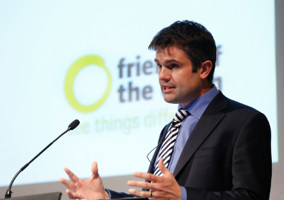Katie Boswell says charities have to ask themselves some tough questions about campaigning.
Much has been made of the chilling effect of the Lobbying Act on charity campaigning. Most recently, charities have claimed they were forced to change their key messages during the UK general election. Some also worry that they may retrospectively be held to account for activities when they had no idea a snap election would be called.
But something less often discussed is how charities too often campaign badly, and for the wrong things. This deep threat to effective and relevant campaigning comes from charities themselves when they fail to be led by their users’ priorities.
'Some have drifted away from users priorties'
All charities exist for their users—and many started as groups of individuals who came together to have a stronger collective voice. Some charities continue to have a strong link with their members or users: 51 per cent of charities in NPC’s recent State of the Sector research (Charities taking charge surveyed 300 sector leaders) said they had involved their users in developing campaign messages. But other charities have drifted away from their users’ priorities, meaning that they fail to represent their users’ voices with authority and legitimacy.
Charity campaigns that are disconnected from their users increasingly find that people affected by the issue hit back.
When Invisible Children’s Kony2012 campaign got more than 20 million hits on YouTube, a powerful video from Ugandan journalist Rosebell Kagumire went viral in response. Rosebell pointed out that the NGO’s calls for American intervention in Northern Uganda were disconnected from the situation on the ground and the priorities of local communities.
In the UK, RNIB’s See the need campaign was criticised by visually impaired people for being "simplistic and damaging". By contributing to negative social attitudes towards visual impairment, the campaign may even have hindered the very people it set out to help.
'People-powered campaigns offer an answer'
People-powered campaigns offer one answer to these challenges. Charities taking charge also outlines how organisations are re-imagining charity as a vehicle for social movements.
Some are working more closely with existing social movements, while others are mobilising and organising their communities to campaign for change.
For example, Scope trains young disabled people to campaign on issues that they are passionate about through the Scope for Change programme. Women’s Aid uses its campaigning to give a voice to survivors of domestic abuse, while Gingerbread worked with its community of single parents to co-create a campaigning toolkit.
Internal barriers also restrict charities from fulfilling their campaigning potential
When The Sheila McKechnie Foundation surveyed 100 campaigners, the vast majority (91 per cent) thought campaigning’s legitimacy was under threat.
Asked about the sources of the threat, over half cited external forces such as negative media coverage, funding conditions, or Charity Commission guidance. Yet 53 per cent also cited internal barriers such as senior managers and trustees being more cautious about campaigning.
Trustees can be risk-averse and afraid to be seen as political. Senior leaders may be reluctant to give up control of campaigning activities or outcomes—even though this very lack of control is often the element needed to form effective campaigning coalitions or build wider movements for change. And funders can often exacerbate the situation by being overly prescriptive in their support for campaigning charities.
These frustrations faced by charity campaigners echo our experience at NPC (New Philanthropy Capital) having worked with hundreds of charities. For instance, campaigners based in service delivery charities report that their leaders don’t always understand or prioritise campaigning. They are so used to competing on service delivery that they may be reluctant to share power to create effective coalitions.
Examples of these collaborations are the End Violence Against Women coalition which has been running since 2005 or The Richmond Group’s joint manifesto for GE2017 for meeting the needs of the 15 million people living with a long term health problem. This underlines our message to charities: you should focus on what you’re best at and work with others elsewhere.
Campaigning charities that fail to adapt risk falling behind
Research in the US has shown that the most successful advocacy campaigns combine the ‘new power’ of networks with the ‘old power’ of central coordination. Typically, a central body frames the issues and coordinates energies towards shared milestones but grass-roots supporters have the freedom and agency to adapt the campaign to their own contexts.
The result is a powerful movement supported by a diverse network of allies that can achieve lasting policy and social change. Examples include Black Lives Matter, Fight for $15, or the campaign against Keystone XL. These lessons can be applied across the pond as well to the UK charity sector.
These examples also show that technology and user experience design offer new opportunities to galvanise people power around a cause. Yet platforms provided by social media for instance also pose a danger. Charities risk becoming trapped in an echo-chamber of existing supporters and networks. Campaigners need to proactively move out of their existing bubbles to build connections with new audiences and build effective alliances for long-term change.
Charities taking charge showed that 37 per cent of those surveyed expected to be doing more public-facing campaigns in three years’ time, while 59 per cent expected to do about the same amount. Today’s turbulent political environment is nothing to shy away from; in fact charities and their users’ voices are needed now more than ever.
Charities that are serious about campaigning need to ask themselves tough questions. Is our governance fit for purpose? Are we led by our users’ priorities? Are we willing to cede control to create effective coalitions or powerful movements? Are we building connections beyond our core group of supporters to mobilise diverse networks of allies? Exploring these questions can help charities to maximise their campaigning impact and achieve the goals that their users want—which is the ultimate reason that charities exist.
Katie Boswell is interim deputy head of charities at NPC
NPC is hosting a breakfast event about the impact of the Lobbying Act tomorrow and will broadcast the discussion on Periscope
Related articles












